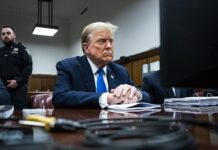 The recent church attacks in Zaria and Kaduna and the reprisals that followed are more or less like scripted patterns from the recommendations of the White Paper on the 2011 post-election violence in the state. About three weeks ago, we published the exclusive story of the White Paper’s resolutions, in which it says that one of the antidotes to the recurring violence in Kaduna is to divide the state; that is to create a new state out of the present one.
The recent church attacks in Zaria and Kaduna and the reprisals that followed are more or less like scripted patterns from the recommendations of the White Paper on the 2011 post-election violence in the state. About three weeks ago, we published the exclusive story of the White Paper’s resolutions, in which it says that one of the antidotes to the recurring violence in Kaduna is to divide the state; that is to create a new state out of the present one.
A judicial commission of enquiry was set up after the people of the Southern and Northern parts of the state turned against each other in a killing spree, after the election that produced Governor Patrick Ibrahim Yakowa. The CPC was initially leading in the poll, but the PDP machine came from behind to clinch victory.
The commission of inquiry which was chaired by Muhammed Lawal Bello in its submission said the agitation for a new state was ‘fresh and valid’ and could be the antidote to the mutual distrust between the two groups.
And just when I thought of doing a critique of the commission’s resolution, another conflict ensued. Boko Haram attacked two churches in Zaria and one in Kaduna, and all hell was let loose in the metropolis. The pattern of killings, to some extent, gave vent to the White Paper’s resolution that the people were actually split down the line. Surely, the killings jolted anyone, who has even the remotest connection with Kaduna, especially because of past bloodletting of this nature.
How did it happen just few weeks after the White Paper suggested the division of the state? Are the people of Kaduna state acting that script or was the crisis a spontaneous response to the Boko Haram attacks? Why is it that it that the violence occurred exactly in line with the White Paper’s recommendation?
I had thought (and I still feel that way) that what the White Paper proferred was more of political solution, than realistic answers to the crisis of co-existence. If state creation is an all-cure remedy, the agitations for it would have stopped a long time ago. From the initial three/four regions, the Gowon government created 12 states in 1967, with the hope that it would avert the civil war but the war still happened. The number later rose to 19.
The military governments of Generals Ibrahim Babangida and Sani Abacha jacked it up to 36 between 1991 and 1996 . And now we are back to square one as far as the clamour for state creation is concerned. If state creation could remedy some of our problems, the mutual distrust that exists in some states like Kogi, Benue and Delta to mention a few would not subsist. When the agitation for Kogi state was on, the Ebira, Igala and Okun people thought they could share power amicably.
The three groups belonged to the old Kabba province, and there is a lot of cultural and historical affinity between the Ebiras and Igalas having historically belonged to the Kwararafa kingdom and the same language group. However, since the creation of the state in 1991, it has been in the firm grips of the Igalas except the years between when the military was in charge. The same anomaly exists in Benue and several other states.
It is in the light of this, that I thought the idea of dividing Kaduna as proposed by the White Paper is not a sustainable panacea. State creation is all about the struggle for power and it’s an elite agenda. The White Paper did not take into consideration and did not suggest how Kaduna metropolis would be ‘shared’.
Already the town is sharply divided between the North and the South and those caught in-between are in dilemma. So, when it comes to dividing the state, the issue of where Kaduna town belongs—between what may be called Southern and Northern Kaduna states would surely crop up. And God save us, if that does not lead to another orgy of violence.
There are questions concerning the ‘how’ and ‘what’ of the new thinking. However, to be fair to the group, (members of the commission of enquiry), they did, in their report, worry about these issues. Even though their report is based on what the mainly Christian South and predominantly Muslim North said they wanted, they noted that “it is also not demonstrated whether the new states will be free from ethnic, tribal or religious dichotomies”. And I dare add, that there was also no consideration for the Christian indigenes of Wusasa in Zaria in presumably Northern Kaduna state and the Muslim indigenes of Lere, Kafanchan in Jama’a LG, all of which would fall into the conceived Southern Kaduna state.
State creation is good and I’m not in any way against the creation of a new state from Kaduna state. However, we have to exercise restraint and caution in our classification of people/areas based on religious dichotomy. Or we’ll fall into the very trap that Western powers have weaved around to perpetually divide and create crisis among us.
The West talks about mainly Christian Southern Nigeria and mainly Muslim Northern Nigeria. But you and I know that this is not true. It’s trash and a simplification (or should I say mystification?) of the problem of Nigeria. There’s a high concentration of Muslim population in the South as well as a high percentage of Christians population indigenous to the North.
With due respect to the gentlemen that comprised the commission of inquiry, it is a wrong-headed approach to situate the crisis-torn and crisis-weary Kaduna in state creation, though it may be desirable. We have to learn to live together as Nigerians. My theory has always been, ‘live and let’s live’.
If all these killings and destructions all these years have not succeeded in sending one group or the other out of town, it then follows that we have to accommodate one another. That was already being achieved until last year’s post-election violence and the emergence of Boko Haram. Conversely, religious politics has to be eschewed, from our psyche and polity.
In less than a year after South Sudan attained independence, the people are now more embroiled in crisis than they had been in the last 10 years before independence. They are still prone to violent conflicts among themselves and between them and Sudan.
If breaking up nations is enough panaceas for peace and peaceful co-existence, why is there no calm in that country after over 30 years of slaughter and now that they are independent? The future belongs to political and economic integration in the mould of European Union and ECOWAS. small disparate principalities would be swallowed. Even at micro level, we have no business dividing and re-dividing states.



